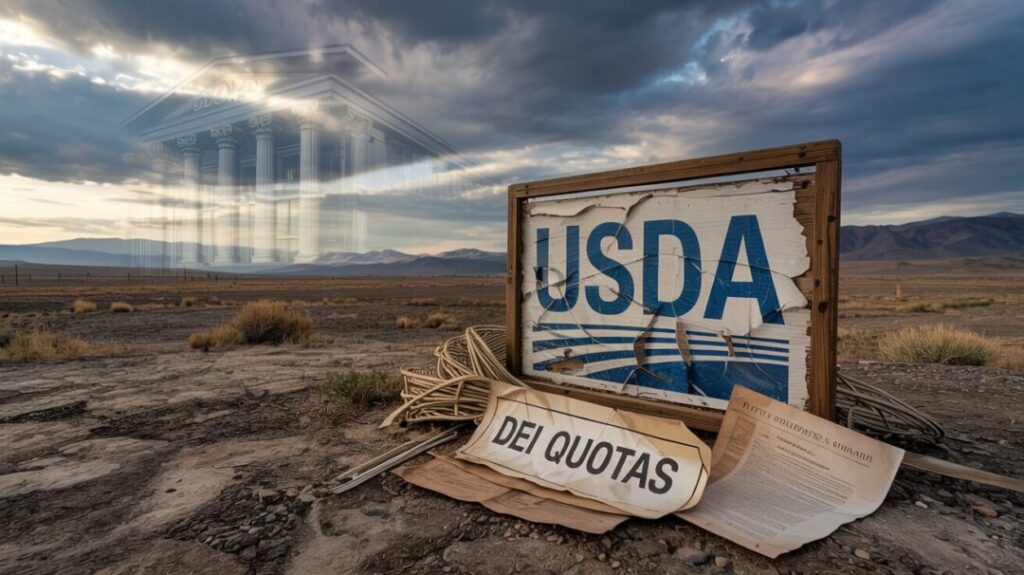In a big court decision on October 15, a federal judge in Texas blocked the USDA’s diversity, equity, and inclusion (DEI) hiring quotas.
The judge said those rules wrongly favored people because of their race or gender, instead of their qualifications.
This matters for states like Nevada, where many ranchers and farmers already feel squeezed by federal rules.
What the Judge Did
Judge Reed O’Connor, in the Northern District of Texas, issued a nationwide injunction.
That means the USDA must stop enforcing those DEI mandates – at least until a full trial happens.
The judge agreed with farmers who said the rules were unconstitutional because they prioritized race or gender over merit.
These DEI guidelines had included “equity multipliers,” which gave bonus points or boosts to people labeled “socially disadvantaged” (like minority or female farmers) in USDA loan and disaster relief programs.
The court said those boosts risk reverse discrimination, unfairly penalizing people who don’t meet those demographic categories.
Supporters of the rule argued it was needed to fix past discrimination, but the judge said the USDA didn’t show the programs were narrow enough or temporary as required under Supreme Court precedent.
This Ruling Levels the Playing Field for Nevada Farmers
In Nevada, agriculture is not as big as in other states – but it still matters a lot, especially in rural counties.
A big example: Elko County in northeastern Nevada has hundreds of ranches. Many struggle with drought, federal land use rules, and limited resources.
Under the DEI mandates, some Elko ranchers say their applications for USDA programs were delayed or denied because they didn’t score well on “socially disadvantaged” criteria – even when their losses were big.
Now those hurdles may be lifted.
The Fight Over “Fairness”
This ruling is part of a broader push by conservatives to roll back DEI across the federal government.
Earlier, USDA Rural Development removed DEI scoring criteria in 14 programs. Also, in July 2025, USDA announced it will stop considering race or sex in many farm loan, grant, and conservation programs.
Advocates for the ruling call it a return to fairness and merit. Stephen Miller of America First Legal called it “a cornerstone victory for meritocracy.”
Critics warn the move could hurt minority farmers who have faced systemic barriers.
The National Black Farmers Association and others argue that the ruling ignores the lasting effects of discrimination. Some point to how minority farmers still hold a small share of farmland.
Conservatives argue that these DEI policies, while dressed up as “equity,” usually end up helping big operators and political insiders by packing on more red tape.
Nevada’s ranchers don’t need diversity audits; they need drought relief, grazing access, and a fair shot at funding.
True equality means judging people by what they do, not what they look like or where they come from. Opportunity grows best when government steps aside and lets hard work, not identity, decide success.
Every rancher, farmer, and producer should stand or fall on the same ground. That’s the America conservatives believe in.
What The Injunction 0Means
Suppose you’re applying for help after your home floods. You submit your proof, and the damage is just as bad as anyone else’s.
But the agency gives extra help to certain people because of their background, even when your loss was just as big. You’d see that as unfair.
That’s what many farmers said was happening under DEI rules.
With the injunction, decisions must again rely more on measurable loss, financial strength, and need – not demographic bonuses.
Next Stop, the Supreme Court
The injunction is preliminary. The full trial is expected in 2026. USDA may appeal all the way to the Supreme Court.
In Nevada, local officials and farmers will be watching how the USDA responds. If the department doesn’t follow the court order, courts could impose fines or further sanctions.
Also, there may be efforts in state legislatures to protect farmers locally from unfair rules.
For Nevada, which more often than not leans conservative in our rural areas, this ruling gives hope to many who feel left out by rules made in Washington.
It’s too soon to celebrate fully, but for now, it restores a measure of fairness to rural America.
The opinions expressed by contributors are their own and do not necessarily represent the views of Nevada News & Views. This article was written with the assistance of AI. Please verify information and consult additional sources as needed.




